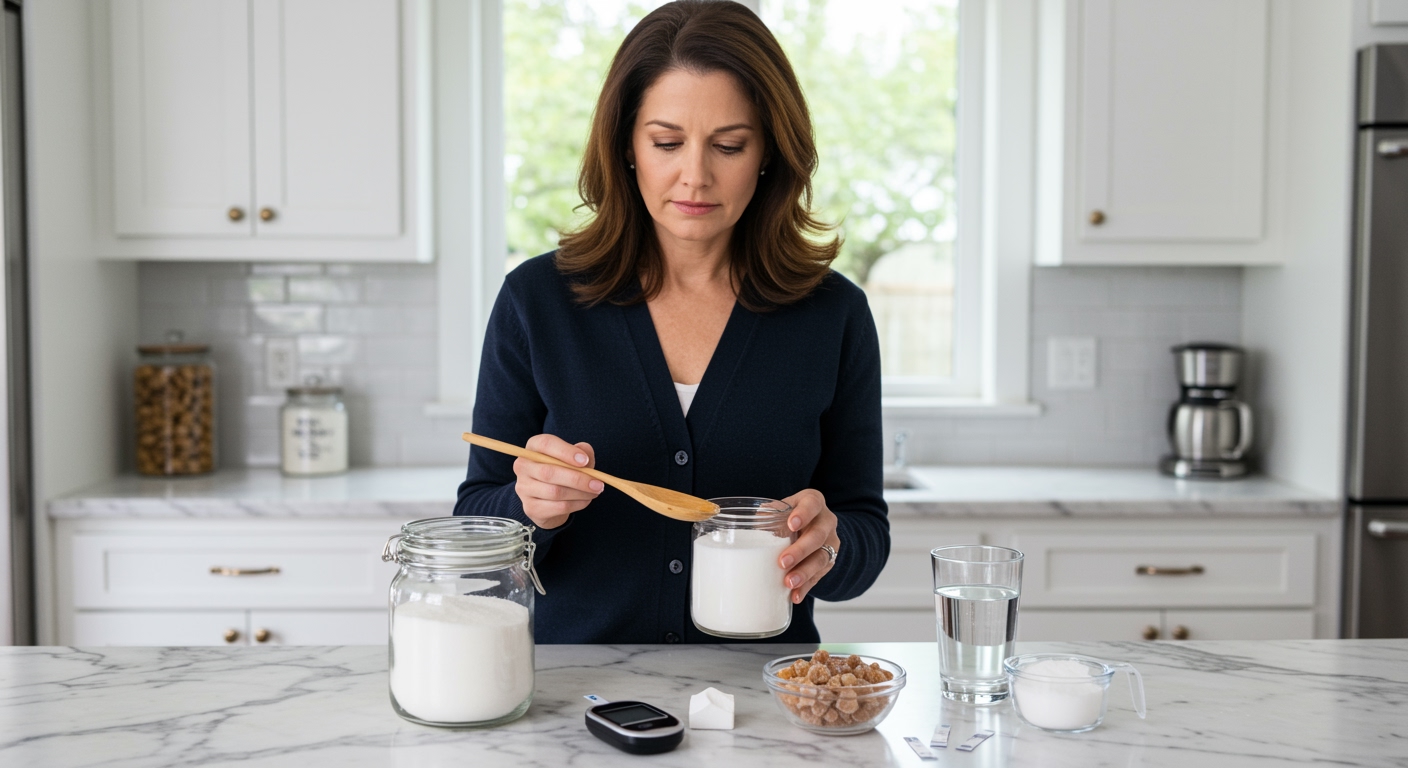✪ Key Takeaway: Cane sugar raises blood glucose just like regular sugar and is not safe for diabetes management.
Introduction
You walk down the grocery aisle and see “natural cane sugar” on countless products.
The word natural makes you wonder if this sweetener might be safer for your diabetes than regular white sugar.
Hi, I’m Abdur, your nutrition coach and today I’m going to explain exactly how cane sugar affects your blood glucose and whether it belongs in a diabetes-friendly diet.
What Exactly Is Cane Sugar?
Cane sugar comes directly from sugar cane plants through a simple extraction process.
The sugar cane stalks get crushed to extract their sweet juice.
This juice then gets boiled and crystallized to form the granulated sugar you see in stores.
The main difference between cane sugar and regular table sugar lies in their source plants.
Regular white sugar can come from either sugar cane or sugar beets.
Both types contain the exact same chemical compound called sucrose.
Your body cannot tell the difference between cane sugar and beet sugar once you consume them.
✪ Fact: Cane sugar and regular white sugar are chemically identical and affect blood glucose the same way.
How Does Cane Sugar Impact Blood Glucose?
When you eat cane sugar, your digestive system breaks it down into two simple sugars called glucose and fructose.
The glucose portion enters your bloodstream within 15 to 30 minutes after consumption.
This rapid absorption causes your blood sugar levels to spike quickly.
Your pancreas responds by releasing insulin to help cells absorb this excess glucose.
People with diabetes either don’t produce enough insulin or their cells resist insulin’s effects.
This means cane sugar can cause dangerous blood sugar spikes that last for hours.
Research shows that both sucrose and high fructose corn syrup increase health risks equally in people with metabolic disorders.
✪ Pro Tip: Test your blood sugar 2 hours after eating cane sugar to see your personal response.
Is Raw Cane Sugar Better For Diabetes?
Raw cane sugar undergoes less processing than white cane sugar.
It retains small amounts of minerals like calcium, iron, and potassium from the original sugar cane.
However, these mineral amounts are so tiny they provide no meaningful nutritional benefit.
The sucrose content remains virtually identical between raw and refined cane sugar.
Your blood glucose will rise just as quickly with raw cane sugar as it does with white sugar.
The glycemic index of raw cane sugar sits around 65, which is considered moderately high.
This means it still causes rapid blood sugar spikes that can be dangerous for people with diabetes.
✪ Note: The brown color in raw cane sugar comes from molasses, not added nutrients that help diabetes.
What About Sugarcane Juice For Diabetes?
Fresh sugarcane juice contains the same sugar compounds as processed cane sugar.
One cup of sugarcane juice provides about 50 grams of sugar.
This amount equals roughly 12 teaspoons of table sugar in liquid form.
Liquid sugars actually absorb faster than solid sugars because they bypass the digestion process.
Your blood glucose can spike within 10 to 15 minutes after drinking sugarcane juice.
The fiber that might slow sugar absorption gets removed during the juicing process.
This makes sugarcane juice particularly dangerous for people managing diabetes.
✪ Fact: Liquid sugars like sugarcane juice cause faster blood sugar spikes than solid sugar forms.
What Are Better Sweetener Options?
Several natural sweeteners work better for diabetes management than cane sugar.
Stevia comes from a plant but contains zero calories and doesn’t raise blood glucose.
Monk fruit sweetener provides intense sweetness without affecting your blood sugar levels.
Erythritol is a sugar alcohol that tastes like sugar but has minimal impact on glucose.
These alternatives let you enjoy sweet flavors without the dangerous blood sugar spikes.
You can also use small amounts of cinnamon or vanilla extract to add sweetness to foods naturally.
The key is finding options that satisfy your sweet tooth while keeping your glucose levels stable.
✪ Pro Tip: Start with half the amount when switching to natural sweeteners as they can be much sweeter than sugar.
The Bottom Line
Cane sugar is not safe for diabetes management because it raises blood glucose just as quickly and dramatically as regular white sugar.
Natural doesn’t always mean healthy, especially when it comes to managing blood sugar levels.
I’d love to hear about your experiences with different sweeteners or any questions you have about managing diabetes through nutrition in the comments below.
References
At NutritionCrown, we use quality and credible sources to ensure our content is accurate and trustworthy. Below are the sources referenced in creating this article:
- UC Davis Health: Both Sucrose and High Fructose Corn Syrup Linked to Increased Health Risks
- Healthline: Sugarcane Juice and Diabetes
- Signos: Sugarcane Juice Glycemic Index
- WebMD: Health Benefits of Cane Sugar





